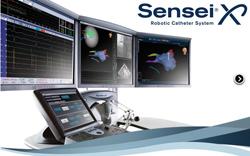
December 12, 2011 – Hansen Medical UK Ltd., a subsidiary of Hansen Medical Inc., a developer of robotic technology for accurate 3-D control of catheter movement, announced a new multi-center worldwide survey evaluating the safety and efficacy of atrial fibrillation (AF) ablation by robotic navigation with the Sensei robotic catheter system. The abstract was presented by Luigi Di Biase, M.D., Ph.D., in a poster session at the American Heart Association Scientific Sessions 2011 at the Orange County Convention Center in Orlando, Florida on Nov. 14, 2011.
The survey evaluated the safety and effectiveness of robotic navigation. The overall complication rate across the entire survey was a low 4.7 percent. After an average follow-up of 15 months, the success rate (defined as freedom from atrial tachyarrhythmia off antiarrhythmic drugs) of robotic procedures was slightly superior at 67 percent compared with that of manual procedures at 64 percent. Most compelling in the survey data are the benefits that robotic navigation demonstrated in both safety and efficacy as the electrophysiologist gained experience with the Sensei robotic catheter system and improved their robotic techniques. The results of this survey, in addition to the other known benefits physicians, patients and payers receive from robotic navigation including less physician and patient radiation exposure, shorter procedure times and less physician fatigue, help establish the value of the Sensei robotic catheter system for patients with cardiac arrhythmias.
"Our survey data demonstrates that the Sensei robotic catheter system is a safe approach for the ablation of AF and has the potential to lead to superior success rates, especially as centers gain more experience with the system," said Di Biase.
The senior author of the abstract, Andrea Natale, M.D., FACC, FHRS, FESC, executive director of the Texas Cardiac Arrhythmia Institute at St. David's Medical Center in Austin, Texas, said, "This is an important survey, and it demonstrates the safety and the efficacy of the Sensei robotic catheter system."
"This comprehensive survey data –– as well as the numerous benefits of our flexible catheter robotic system, such as reduced radiation exposure, shorter procedure times and lower physician fatigue –– demonstrate the value of the Sensei robotic catheter system as an alternative to manual procedures in arrhythmia patients," said Bruce Barclay, Hansen Medical's president and CEO. "In particular, the data showed the benefits derived in both safety and efficacy as operator experience with the system increases, and, importantly, points to the potential of replicating these successes in other centers through improved training and the sharing of best practices."
Barclay stated, "The data reported in this survey includes procedures from the earliest clinical experiences with the system. Since initial launch in 2007, Hansen and our physician customers have gained significant experience and knowledge through the more than 7,000 patient procedures that have been performed with the system. During this time, physicians have developed advanced robotic techniques while the company has made several product design and feature enhancements including the Sensei robotic catheter system with advanced catheter control and visualization features, improved mapping technology interfaces with our strategic partners –– St. Jude, Phillips, GE and Siemens –– and the company's advanced tactile feedback technology called IntelliSense including Intellisense Vibe and Flex functionality. "
"Also during this time, the company has developed a world class education and training program designed to provide physicians and their staff with the ability to use the system with confidence and precision in a shorter period of time." Barclay said.
Under the survey, 1,728 patients with AF were treated with the Sensei robotic catheter system at 12 different sites, including Texas Cardiac Arrhythmia Institute at St. David's Medical Center; Methodist DeBakey Heart and Vascular Center, Houston, Texas, and Christiaan Barnard Memorial Hospital, Cape Town, South Africa, from June 2007 until December 2009. Patients with all types of AF were used in the study with 39 percent of the patients having either persistent (29 percent) or permanent (10 percent) AF, and the remaining (61percent) with paroxysmal AF. Cappato's Worldwide Survey (2010) reporting on 16,309 AF patients was used for historical control of manual ablation results. Cappato's Worldwide Survey is conducted periodically by a group of prominent electrophysiologists and is considered a leading resource for ablation efficacy and complications by manual technique.
For more information: www.hansenmedical.com


 January 05, 2026
January 05, 2026 









